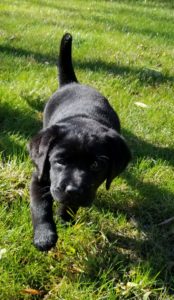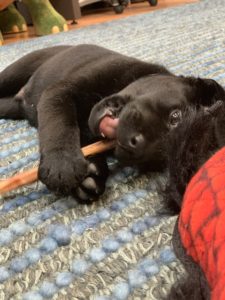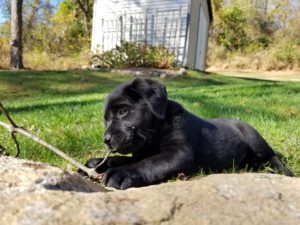Super Valuable Puppy Training

Puppies come at you with a lot to take on!
From the moment you take a puppy home, everything you do is a learning experience that shapes future behavior. Avoid the common mistakes and make a big difference with these tips:
1) Put the pup’s overnight crate RIGHT next to your bed. I literally clear off my nightstand and set it up so that the door of the crate faces my head on the pillow. We are at eye level with one another. This may sound extreme, but having your pup so close helps form your bond and keeps him from feeling lonely overnight. Plus you can put your fingers through the crate door without having to get out of bed (to sooth a pup who is inevitably going to start whining about missing his litter mates those first couple of nights).
Keep your pajamas on and be prepared to take the pup out to go potty once or twice during the night. If you’re lucky they’ll be sleeping through the night within a couple of days, typically a week or two at most. Then, you put the nighttime crate on the floor and gradually (each day) move it further and further from your bed to wherever you like.
Bonus tip: During the daytime, set up a crate in an area where people are around. Never isolate a crate in a totally separate quiet room.
Bottom line: A pup that is used to being in a crate near you can easily adapt to separation and learn to be self-assured and restful when you are not together. A pup that is immediately forced to deal with isolation away from you will associate the crate with total separation and fear of being alone. Which leads us to tip #2…

Don’t skimp on the chew options. Those little mouths always need something to work on.
2) Give your pup something to chew on during downtime. And… All… the… Time. Want a pup to learn to be calm and quiet in a crate? Give him something to chew on. (Not overnight, but ANY other time he is in a crate or separated area.)
Want him to learn not to chew your furniture or your shoes, or your kids? Give him something to chew on.
Want him to let you pet him all over without mouthing your hands and clothes? Give him something to chew on.
Want him to give you a break from constant puppy care so you can watch your favorite TV show? Give him something to chew on.
Want him to rest and assimilate all of the new information you just taught him in a training session? Give him something to chew on.
You see the theme, right? Get your house loaded with safe chew items: animal chews, Nylabones, stuffed Kongs (frozen wet food is fantastic in a Kong), tough plush toys, food puzzle toys (Nina Ottoson anyone?), cardboard boxes, plastic water bottles (yes, I am creative with all manner of recyclables as puppy toys, but you do what YOU feel good about).
Bottom line: Providing more than enough “chew-ables” will be one of the simplest, smartest things you can do to raise a great pup.

Don’t feel the need to grab every thing away from your pup. Most of the stuff they pick up isn’t going to hurt them. Just be smart with your judgment.
3) Don’t chase your pup and snatch away objects he picks up. Make it a game of “Ooooo – what did you find?!?” And trade everything for a good treat (if you need to take it at all).
It’s completely normal for pups to pick up EVERYTHING they find as they explore the world. Don’t overreact. Pups that have stuff constantly grabbed out of their mouths will soon start to run away from you when they find things. Pups that run away from you will get cornered. Pups that get cornered become resource guarders and/or scarf things down ultra fast so that you won’t take them away. Making a big fuss when your pup picks stuff up off the floor/ground is a common mistake – and resource guarding (aggressively defending objects or food items) is an all-too-common behavior that results from that mistake.
Don’t turn your pup’s object exploration into a war with you. If you do, you’ll just train a thief that over-values meaningless objects. Do the exact opposite: laugh when the pup picks something up and then calmly trade it for a treat. Each time he grabs something, take it as a lesson to puppy proof the house a little better and keep those things out of reach for now. At the same time, praise/play with pups whenever they get THEIR toys.
If you do this, you’ll have a pup who grows out of picking up meaningless stuff, or brings it to you playfully, ready to always drop it for you. I even let my pup carry around objects he finds outside (as long as they’re harmless of course). He walks around proudly with sticks, gloves, plastic water bottles – whatever. Eventually, he drops them after getting a chance to hold them for a bit. If I need him to drop it sooner, I just trade a treat. Later I can put that on cue. This raises a dog who doesn’t guard stuff and instead is great at “sharing”, retrieving, and most importantly – trusting. Trust goes a long way in a relationship that’s going to last over a decade. It’s the foundation for getting a lot of the good behavior you’re hoping for in your adult dog: listening around distractions, coming when called, allowing you to handle different body parts for grooming or health, being calm when you leave the house, and so much more. Trust me – on all of the above!
~
Are you a fanatic for learning more about behavior and training? CATCH courses and workshops go beyond basic obedience to help students work with dogs that have behavioral issues. We find the problem-solving process to be fascinating: from basic issues like jumping, pulling, barking, and house training to learning about the more advanced challenges like fear and aggression cases. Many of our students turn their passion for dogs into newfound skills and use them to work with dogs that otherwise would not have the easiest time finding a forever home. Get in touch with us to learn more!






 Phone:
Phone:
It was especially helpful to read your tips about how dogs can end up chewing anything when not trained properly. With how much furniture and delicate items my sister has in her house, I was surprised to learn that she wanted to raise a pet dog. Since I know how aggressive these dogs can get, I became worried that getting a dog will end up ruining a lot of the expensive belongings she has, so I’ll make sure she reads your article before helping her find a puppy that she’s willing to take care of.